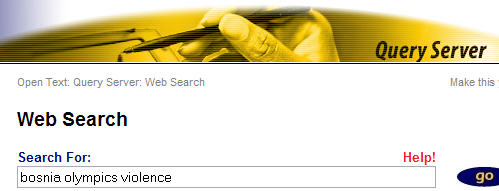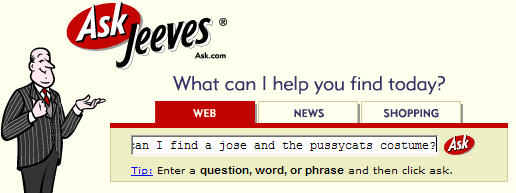Search Engines and On-line Resources: An Overview by Kevin Kvalvik
This will be a brief introduction to those tools that I have found thus far that seem to be the best (and a few of the worst.)
Meta Engines are becoming the most valuable search tools on line. These tools send your query almost instantly to several other engines simultaneously. These results are sorted compiled, and in some cases grouped according to content. If you are trying to get the most information and have it presorted then these tools work as fast and use vastly more resources than traditional engines. However, to expedite the search they often will not sort all results, but just use the top responses from each engine. Nonetheless, I find that for most searches these new hybrids are still easier and more efficient.
The best as of October 17, 2002 include these:
Meta Engines:
Vivisimo. A beautiful and efficient Meta engine that clusters hits into simple subgroups. This is a frames environment, so as you search the engine remains visible and active. An amazing tool as you can leave the page open while searching parts of each listed URL.

http://www.queryserver.com/web.htm
Queryserver. An elegant meta-engine that is no nonsense and categorizes according to content. Non-commercial look and interface.

Ixquick. A Meta engine that uses another eleven engines to do its lifting, and ranks, but does not group results.

37.com. If more is better then this is the site of sites. A hideous design, but this sends out queries to thirty seven engines at once. The results seem to be neither ranked nor comprehensive, but this is an example of doing way too much, and doing it poorly.
Zworks. Meta engine with ten engines serving it, but has annoying commercial pop ups and does not categorize big returns.
http://www.searchengines.com/generalMeta.html
More meta-engine choices at this URL.
Other types of engines:
The Open Directory Project: This is a search tool that is edited by actual volunteer human beings for content and quality. Far fewer hits, but they may well be of greater quality.
Ask Jeeves: This project is designed to give you “real language” searches. If you are at a complete impasse in beginning your search this is a fun place to start. Just type in your query, like “where can I buy a used harp?” and Jeeves will have lots of suggestions.
http://web.archive.org/collections/web.html
Archive.org: Internet archive of 10 billion web pages dating from 1996 to present. This is not a search engine, but a repository for web sites as they existed at some time in the past. They have huge quantities of sites that now no longer exist, of have changed. They bill themselves as the largest “library” in history.
Yahooligans: This is a search tool for kids. More of a directory than a search engine. Rather than looking for all the sites in the world, it has a collection of appropriate URL’s for little ones. Sort of commercial, but an important site to know about for kids who might, otherwise, inadvertently find adult material.
http://www.sla.org/chapter/ctor/toolbox/resource/cover.htm
Library Research Center: Ground zero in web research. This is a “not-user-friendly” environment for hard core research types who not only want to look into subjects, but also want to look into different ways of looking into them.
Reference .com: The best reference for simple, quick dictionary/encyclopedic responses. If you have a fourth-grader doing a report on Lincoln, this is a good starting place.
Ditto: This site works like www.images.google.com but was the first to give a thumbnail interface. If you are looking for images only, the interface on this is unique and user-friendly.
http://www.noodletools.com/noodlequest/
Noodlequest: This site provides an initial survey of the user and gives a response and list of tools that seem appropriate to that individual’s use. This serves as an introduction to the web for beginners and makes recommendations according to age, content, and scholarly acumen. The final results and recommendations often lean to ward more reference oriented search tools. Still this is a unique offering about search engines and research tools.
The Standards
Teoma. A clean, non-busy interface on this new search engine with unique relevancy categories (includes rankings based on site popularity). As of October 2002, this was the sweetest simple, yet robust engine on line.
Fast Search. Arguably the fastest of the fast. Results come back as you hit return. The results are ranked but generally you get way too many barely filtered hits. Nice interface and not as blatantly commercial as Yahoo, etc…
Hotbot. A standard and ugly search engine, unless you use the “advanced functions,” which I strongly recommend. These allow you to parse down by specific countries, topics, phrases (inclusive and exclusive) and even the date of the site.
Google.
Top quality search service with
rankings based on site significance. Google's relevancy
paradigms have significantly improved the precision & reliability of searching
the net. Those tabs across the top? Use them. They
are amazing. For instance if you are looking for images, the images tab/search
tool is fully different than the standard. Try it.
Other standards are AOL, Alta Vista, Lycos and Excite. These sites are all
very commercial and offer little that stands out unless they become your tool
of choice. Yahoo is still powered by Google, although
they no longer say that on their site. MSN pops up from Microsoft Explorer
whenever you put in a dead URL. This alone means if you have any pride at
all you cannot use it.
Some Simple Tips About Search Engine Use.
 To use the Internet at any level one must use search
engines. As you enter queries you will find in most of these engines using
quotation marks around phrases will make the engine search for that exact
combination of words. While I get over a quarter of a million hits for the
separate words, love, among, the, ruins, review; I get only a handful
when I put quotation marks around the title “love among the ruins”
and then the word “Ruin.” This is the use of what is called “Boolean
logic.” This is named after a guy named George Boole.
He was a scientist using the terms of “AND” or “NOT” and so on to assist with
searches limiting and tweaking the query to make it more obvious what results
you want.
To use the Internet at any level one must use search
engines. As you enter queries you will find in most of these engines using
quotation marks around phrases will make the engine search for that exact
combination of words. While I get over a quarter of a million hits for the
separate words, love, among, the, ruins, review; I get only a handful
when I put quotation marks around the title “love among the ruins”
and then the word “Ruin.” This is the use of what is called “Boolean
logic.” This is named after a guy named George Boole.
He was a scientist using the terms of “AND” or “NOT” and so on to assist with
searches limiting and tweaking the query to make it more obvious what results
you want. 
You also have “real language” entry possibilities with
engines like “Ask Jeeves” where they have you type
things like, “Where can I find a costume for Josie and the Pussycats for Halloween?”
Since this is a very commercial enterprise, Jeeves
will have lots of suggestions to help you spend your money. Understand there
are a number of sites that pay for every customers sent top them from these
“pay-per-click” sites. So some of the references you are given may
be a result of a conflict of interest.  For a listing and information about them you may look
at http://www.payperclicksearchengines.com/
.
For a listing and information about them you may look
at http://www.payperclicksearchengines.com/
.
All of these engines give you a “universal resource locator” (URL), which you will click on (because it is a “hyperlink”) and your browser (the application that you are using for this Internet surfing to begin with, Netscape, Explorer…) will then access that computer assuming that it is still in business, and then you get the data from that site.
In Defense of Incompleteness: A Postscript
This list is not comprehensive. It cannot be as there are more search engines than one could count and that number is always changing. Further, the effectiveness is largely subjective, as the interface with which you work the most seems obvious and so on. I have intentionally left out dozens of popular engines as a matter of preference. If you like the http://www.dogpile.com/ meta tool then you do. I have left it out as it is as they say in some popular film, bcause it’s “so ten minutes ago.” Then there is the name itself… These recommendations are designed to point out some tools that are receiving attention now. This is not a comprehensive list, although a place to look for lots more info is at www.searchengines.com . Also, there are some differences between directories and search engines, but these will not be taken into account in this short introduction.
Nonetheless, there are numerous services that rate “global” (i.e. Not specific to domain, content, or place etc…) search engines. Those which are consistently rated best by most of these are included in this list.
Criteria: The number of hits is by no means the only gauge for judging efficacy.
One must also note:
The number of hits that are useful
Interface simplicity vs. complexity
Advanced-user features
Commercial intrusions
How the results are returned and sorted
How speedy are the results
Freshness (how many URL’s are no longer working…)
And, of course the most overlooked quality: Aesthetics